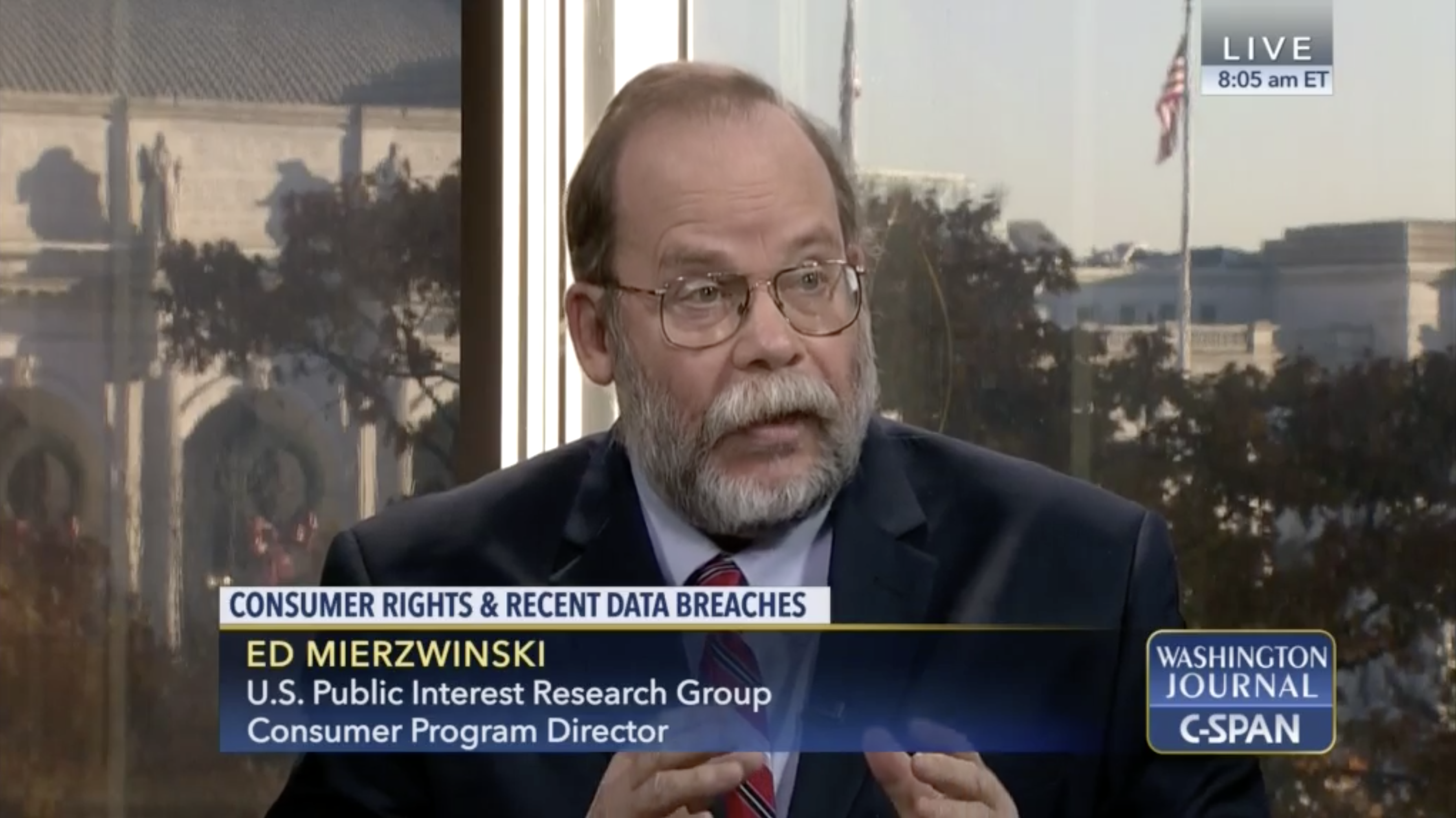Summer 2018 News Briefs
Consumer Protection
Defending The Protections Americans Rely On

U.S. PIRG’s Ed Mierzwinski speaks to the need for stronger consumer protections after the Equifax data breach and congressional attacks on the Consumer Bureau. Photo: C-SPAN
After the 2008 economic crisis, millions of Americans lost their jobs, their homes, their retirement savings and more. That’s why our national network played a lead role in setting up the Consumer Financial Protection Bureau, and helped put in place rules of the road to keep Wall Street in check.
But now, in the name of regulatory reform, Wall Street, big banks and their allies in Congress are working to strip away these rules and dismantle the Consumer Bureau. With the support of our members, U.S. PIRG is on the ground in state capitals and Washington, D.C., keeping an eye on threats to commonsense consumer protections.
Opposing Anti-Consumer Attacks In Washington
We’ve been successful in stopping legislation that would change the funding and leadership structure of the Consumer Bureau, both of which are key to the agency’s past success and continued independence. And we’ve been hard at work opposing the anti-consumer moves of Mick Mulvaney, who has been limiting the Consumer Bureau’s capabilities since the president put him in charge of the agency last November.
Another major threat to consumers is S.2155, a bank deregulation bill that will likely increase mortgage fraud, racial discrimination and risky banking practices; replace stronger state laws against identity theft; and more.
With your support, our advocates fiercely opposed this legislation to let Equifax and big banks off the hook, and are calling on decision-makers at the state and national levels to instead enact reforms to give consumers more control over our financial lives.
Solutions To Problems We All Face
Whether it’s defending the original mission of the Consumer Bureau or opposing bills that ignore the painful lessons of the 2008 financial crisis, U.S. PIRG works to unite people from across the political spectrum around commonsense solutions to problems we all face.
But we couldn’t do any of this without the support of our members. With you by our side, we’ll continue defending consumers and working toward a safer, healthier, more secure future.
Learn more about our Consumer Defense program and campaigns here.
21st Century Transportation
Paving The Way For Electric Transportation

The number of electric vehicles on America’s streets is at an all-time high, but are our cities ready to accommodate this rise in clean cars? Photo: Matej Kastelic via Shutterstock
Sales of electric vehicles nationwide increased 38 percent in 2016, and another 32 percent in 2017, according to a February report from U.S. PIRG Education Fund and Frontier Group. States can accelerate this progress, and also transition to electric school and transit buses, by taking advantage of their portion of the $2.9 billion settlement of Volkswagen’s massive emissions scandal intended for environmental mitigation actions.
Another report released in May by U.S. PIRG Education Fund and Frontier Group shows the majority of America’s buses remain dirty—but clean, all-electric buses are available, and they’re cheaper for school districts and transit agencies to run in the long term.
An all-electric transportation future offers many benefits, including cleaner air and the opportunity to reduce greenhouse gas emissions that contribute to climate change. With your support, we can leave federal inaction in the slow lane and put our communities on a fast track to a cleaner, healthier future.
Check out U.S. PIRG Education Fund’s latest reports here.
Toxics
No More Bee-Killing Pesticides

Photo: ConstantinosZ via Shutterstock
Bees pollinate everything from strawberries to broccoli to the alfalfa used to feed dairy cows, and without them, our food supply and environment would be at risk.
Even so, Americans spray about 46 million pounds of neonicotinoid pesticides—one of the worst types of bee-killing pesticides in the world, yet also the most widely used—on our gardens and public spaces every year.
Given the consequences, U.S. PIRG is calling on states to ban the sale of bee-killing pesticides. There is already momentum building: Maryland and Connecticut have both taken important action to limit the use of neonics, and the European Union just voted to completely ban them.
We can, and must, do better. Join us in calling on states to take action to protect bees and our food.
Learn more about our Ban Bee-Killing Pesticides campaign and take action here.
Product Safety
CarMax Selling Vehicles With Dangerous Defects

Photo: Ildar Sagdejev via Wikimedia Commons, CC BY-SA 4.0
When we drive to work or take our children to school, we shouldn’t have to worry if we’re driving an unsafe car. Yet a survey of nearly 1,700 vehicles for sale at eight CarMax locations found that more than 1 in 4 vehicles had unrepaired safety recalls.
The report, released by MASSPIRG Education Fund, the Consumers for Auto Reliability and Safety Foundation, and the Center for Auto Safety, found that on average, the percentage of vehicles with unrepaired safety recalls CarMax offered for sale has more than doubled, jumping from 12 percent to 27 percent, compared to survey results from 2015.
To protect consumers from dangerous cars like these, U.S. PIRG is suing the Federal Trade Commission to overturn consent orders that allow used car dealers to advertise unsafe vehicles.

